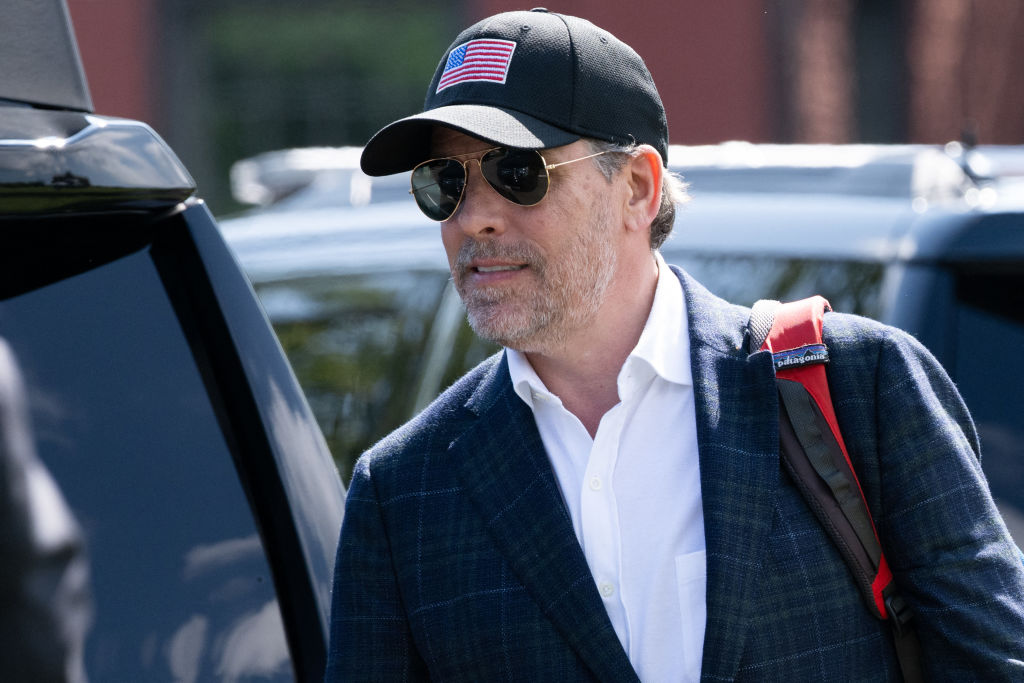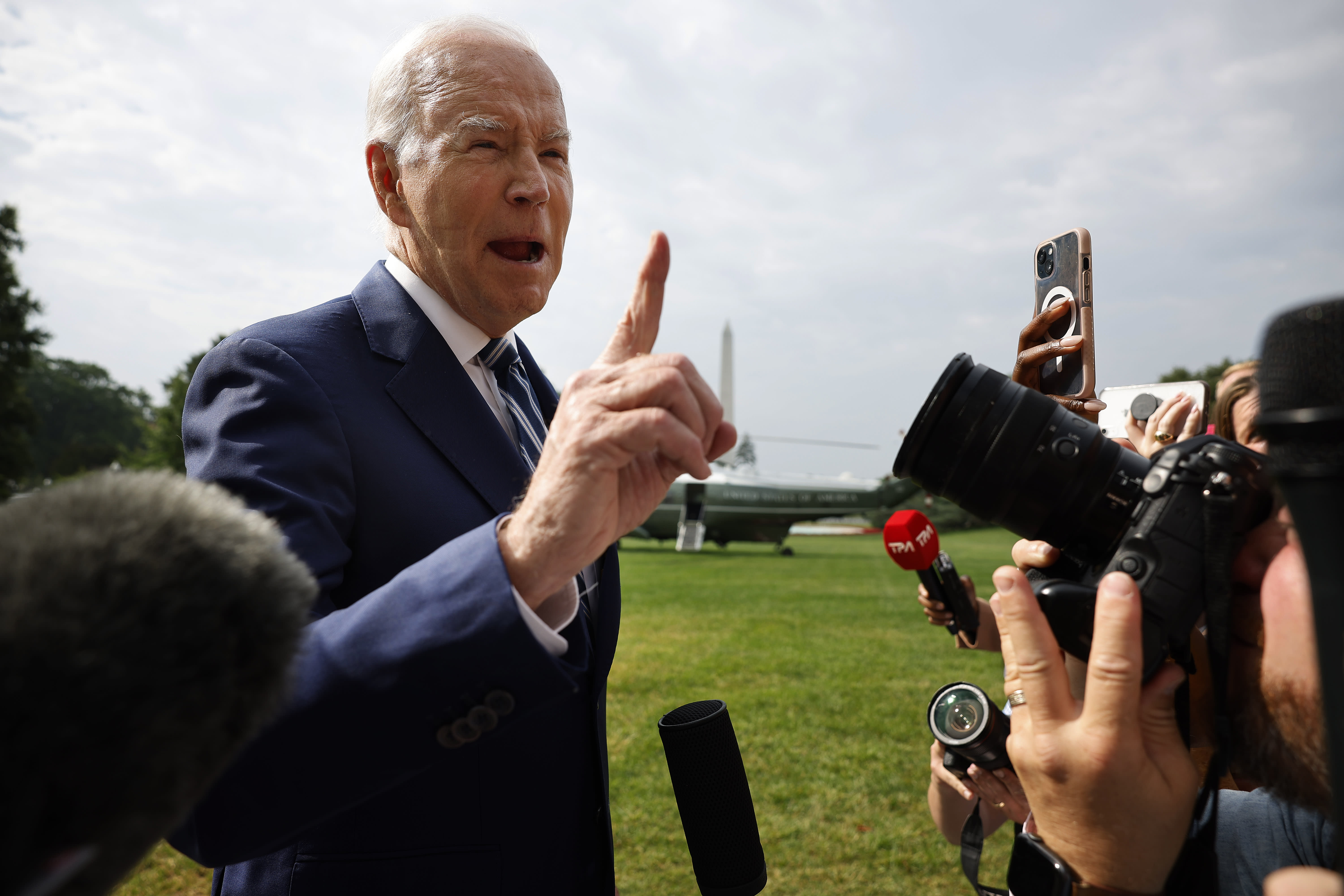
House Republicans raised unsubstantiated allegations Wednesday against President Joe Biden over his family’s finances as they summoned IRS whistleblowers to testify publicly for the first time about claims the Justice Department improperly interfered with a tax investigation into Biden’s son Hunter.
Lawmakers were hearing from the two IRS agents assigned to Hunter Biden case, which looked into his failure to pay taxes. The president's son pleaded guilty recently to misdemeanor tax charges in what Republicans have derided as a “sweetheart” deal.
Watch NBC6 free wherever you are
Still, House Republicans are deepening their own investigation, making broad claims of corruption and wrongdoing by the Bidens, which they acknowledge are not proven.
Get local news you need to know to start your day with NBC 6's News Headlines newsletter.
“We will continue to follow the money trail,” said Rep. James Comer, chairman of the House Oversight and Accountability Committee, as he opened the session.
The Justice Department has denied the whistleblowers’ allegations.
The top Democrat on the committee, Maryland Rep. Jamie Raskin, called the hearing “a theater of the absurd.”
IRS supervisory special agent Greg Shapley, and a second agent, Joe Ziegler, claim there was what Shapley called in testimony a pattern of “slow-walking investigative steps” into Hunter Biden, including during the Trump administration in the months before the 2020 election that Joe Biden won.
One of Shapley's most detailed claims was that U.S. Attorney David Weiss in Delaware, the federal prosecutor who led the investigation, asked for special counsel status in order to bring the tax cases against Hunter Biden in jurisdictions outside Delaware, including the District of Columbia and California, but was denied.
Weiss and the Justice Department have denied that, saying he had “full authority” and never sought to bring charges in other states.
Shapley testified under questioning during an exchange with Rep. Jim Jordan, R-Ohio, that he wrote an email later that day to memorialize the October 2022 meeting with Weiss and five others. Shapley insisted on Wednesday on his own recollection of what was said.
The second IRS whistleblower, Ziegler, described his frustrations with the way the case was handled, dating to the Trump administration under Attorney General William Barr. The tax agency employee said he started the investigation into Hunter Biden in 2015 and began to delve deeply into his life and finances.
Ziegler, whose name was withheld in closed-door interview transcripts released earlier by Republicans, was referred to by the committee as “whistleblower X,” said Wednesday decided to come forward publicly “not as a hero or a victim,” but as a married, gay Democrat “compelled to disclose the truth.”
Democrats on the committee pushed back on the whistleblower claims that Hunter Biden received special treatment because his father was the nominee for president in the upcoming 2020 election.
Rep. Raja Krishnamoorthi, D-Ill., made the point that Donald Trump was president during the 2020 time frame when the whistleblowers allege there was interference.
Trump’s Justice Department, he noted, issued a memorandum in February 2020 telling prosecutors to “exercise particular care regarding sensitive investigations and prosecutions that relate to political candidates, campaigns and other politically sensitive individuals and organizations," his voice rising. "Especially in an election year!”
Democrats have pointed out that Weiss was appointed by Trump and the federal investigation into Hunter Biden was initiated under Trump. Biden kept Weiss on the case after he won the election.
In one startling moment at the hearing, Rep. Marjorie Taylor Greene, R-Ga., displayed graphic sexual images of Hunter Biden with women, suggesting he had paid for their to travel to Washington, D.C., presumably for sex, in a potential violation of law.
Democrats led by Raskin objected to the graphic content being shown at a public hearing by Greene, saying it was inappropriate.
Rep. Shontel Brown, D-Ohio, said Republicans had “shredded all their credibility.” She questioned whether this was an investigation into the president or “of his son, who does not and has never worked at the White House.”
As Republicans decry what they say is a justice system favoring the politically connected, Rep. Maxwell Frost, D-Fla., pointed to the killing of Emmett Till and the treatment of other Black Americans and people of color across U.S. history and said: “This is the two-tiered justice system."
Republicans have sought testimony from other agents involved in the case, and held a transcribed interview this week with an FBI agent, now retired, who they said was involved. But other witnesses have declined to appear before the panel.
Before the hearing, Comer, R-Ky., acknowledged it has been difficult for Republicans to succinctly outline Hunter Biden’s tangled financial affairs or to provide convincing evidence of any specific wrongdoing by the president or his family.
“It’s so hard to explain,” Comer told reporters. “Hopefully these IRS agents can do a better job explaining than I can.”
His committee picked up on the work of the House Ways and Means Committee, which initially interviewed the whistleblowers. GOP Rep. Jason Smith of Missouri, the head of that committee, joined Wednesday's hearing.
It is unclear how much of the conflict described by the whistleblowers amounts to internal disagreement about how to pursue the investigation or a pattern of interference and preferential treatment.
Justice Department officials have countered these claims by pointing to the extraordinary set of circumstances surrounding a criminal case into a subject who at the time was the son of a leading presidential candidate. Department policy has long warned prosecutors to take care in charging cases with potential political overtones around the time of an election, to avoid any possible influence on the outcome.
In one specific case, Shapley described IRS agents’ efforts to execute a search warrant of a Virginia storage facility where the younger Biden’s documents were being stored. He said the assistant U.S. attorney involved in the case reached out to Hunter Biden’s lawyers, in a move that is seen as customary in cases involving high-profile individuals, but it ruined “our chance to get to evidence before being destroyed, manipulated, or concealed.”
A similar occurrence happened when the FBI officials notified Hunter Biden’s Secret Service detail ahead of an effort to interview him and several of his business associates in order to avoid a potential shoot-off between two law enforcement bodies.
In another instance, Shapley told Congress that in a meeting with Weiss and Assistant U.S. Attorney Lesley Wolf after the 2020 election, he and other agents wanted to discuss an email between Hunter Biden associates where one person made reference to the “big guy.” Shapley said Wolf refused to do so, saying she did not want to ask questions about ’dad.''”
Democrats sought to chalk up the entirety of the whistleblowers’ claims as a disagreement between prosecutors and investigators on how to move forward with charges against Hunter Biden.
“My view here is that we’re spending hours on a disagreement on whether to charge someone and we have a whole democratic process that decides that," said Rep. Ro Khanna, D-Calif. "You don’t get to decide that.”
Republicans have moved ahead, issuing a series of requests for voluntary testimony from senior Justice officials, including Weiss.
Weiss said in a letter to Jordan earlier this month that he would be happy to testify before the committee when he is legally able to share information with Congress without violating the longstanding department policy of discussing an ongoing investigation.
Testimony from Justice Department officials could come after Hunter Biden appears for his plea hearing next week.
___
AP Congressional Correspondent Lisa Mascaro contributed to this report.



